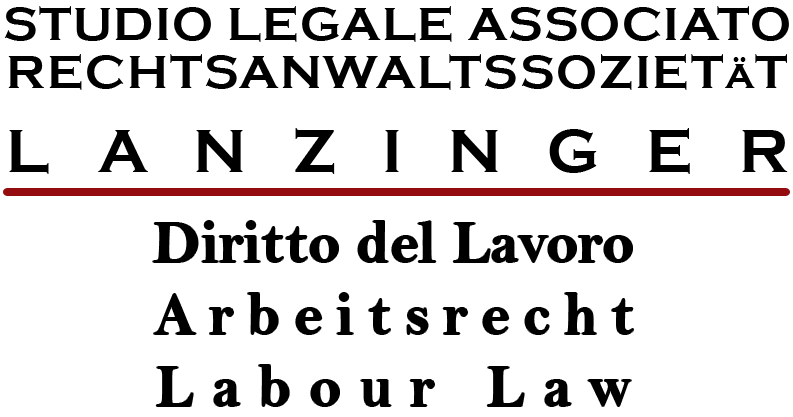DIFFERENCE BETWEEN WHAT IS RECEIVED AND WHAT IS ACTUALLY DUE
The Lanzinger Associated Law Firm is an expert in severance pay matters, thanks to the presence of lawyers specialised in protecting workers' rights. Pay differences, wages, working hours, holidays, vacation, and the aforementioned severance pay are just some of the areas of expertise of the Bolzano-based firm. Call to schedule an appointment and receive consultation from expert lawyers.
Main topics
Wages
Wages represent the compensation that the employer must provide to the worker for the work performed and represent a central aspect of the rights and obligations established by the individual employment contract and by law.
-
continue
In the Italian legal system there is no discipline that specifically determines the principles of Article 36 of the Constitution, according to which the worker has the right to a remuneration proportionate to the quantity and quality of work performed, sufficient to ensure a free and dignified existence for himself and his family.
For this reason, the determination of the minimum wage is generally left to collective labour agreements, in compliance with the fundamental principle affirmed by Article 36 of the Constitution.
Working time
Working time means any period during which the worker is working, is at the employer’s disposal, and is carrying out their activity or duties (art. 1, sec. 2, letter a), Legislative Decree No. 66/2003).
-
continue
The determination of the maximum length of the working day stipulates, after various amendments and additions, that the worker:
- is always entitled to at least 11 hours of rest per 24 hours
- is entitled to breaks of not less than 10 minutes during work, for occupations requiring more than 6 hours of work
- is entitled to a weekly rest period of at least 24 consecutive hours every 7 days, coinciding with Sunday.
Holidays
According to art. 2, Law No. 260/1949, national holidays include 25 April (Liberation Day) and 1 May (Labour Day). For the same purposes, midweek holidays include:
-
continue
- 1 January;
- Epiphany (6 January);
- the Monday after Easter (mobile);
- the day of the Assumption of the Blessed Virgin Mary (15 August);
- All Saints' Day (1 November);
- Immaculate Conception Day (8 December);
- Christmas Day (25 December);
- 26 December.
Workers' pay is not affected by the occurrence of one or more holidays in the period to which the pay relates. If work is performed, remuneration for hours actually worked shall be paid with the mark-up fixed by collective agreements for holiday work.
If the bank holidays coincides with a Sunday, workers are entitled to an additional amount corresponding to a daily rate of pay.
Vacation
The right to vacation is aimed at ensuring that employees have a period of rest during the year to restore their physical and mental energy. For this purpose, the Constitution, in art. 36, 3rd paragraph, establishes that the right to paid annual vacation cannot be waived.
-
continue
Collective bargaining generally provides for a period of four weeks.
Moreover, leave is incompatible with the employee's state of illness and cannot be taken during the notice period of dismissal, nor can it be replaced by any cash compensation.
Termination of the employment relationship
Pursuant to art. 2120, paragraph 1, of the Civil Code, in every case of termination of the employment relationship, the worker is entitled to severance pay, which is calculated based on a portion of the wages due for each year, to be revalued annually according to a rate linked to the trend of the Istat consumer price index for blue- and white-collar households.
-
continue
Pursuant to Article 5(1) of Law No. 297/1982, for workers already in force on 31 May 1982, the seniority indemnity that would have been due on that date is calculated on the basis of the regulations in force at that time and is cumulated for all purposes with the severance pay. The latter is due for all subordinate employment relationships (including fixed-term, part-time, apprenticeship and work-training contracts) and also accrues during the probationary period.
Call the law firm to request further clarification about severance pay.
HEADQUARTERS AND CONTACT DETAILS
OPENING HOURS
- Mon - Fri
- - -
- Sat - Sun
- Closed
P.I 02699620213|
Legal Information
|
Privacy Policy and Cookie Policy







